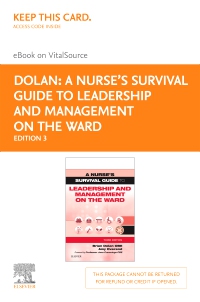
A Nurse's Survival Guide to Leadership and Management on the Ward - Elsevier eBook on Vitalsource (Retail Access Card), 3rd Edition
Elsevier eBook on VitalSource - Access Card

-
Key features:
- Completely updated and revised content written by well-known authors with extensive experience in the field;
- New sections on responsible use of social media, working with different generations in the workplace; how to make an impact, taking care of yourself etc.
- Leading teams in the context of enduring financial and staffing constraints
-
Chapter 1 - The role of the ward manager
Be clear about what 24-hour responsibility means
Be clear about what makes a good leader
Make sure your decisions are informed ones
Clarify your objectives
Understand your legal responsibilities
Be clear about your matron/line manager’s role
Remember you are the patients’ overall advocate
Balance your clinical work with administrative duties
Be aware of the impact of your role on others
Chapter 2 - Manage your time
Define your workload
Organise your office
Control your diary
Keep up with your e-mails
Cut interruptions
Keeping abreast of your reading
Getting the best from meetings
Chair meetings effectively
Learn to let go through delegation
Be proactive
Chapter 3 - Create a positiver working environment
Plan ahead
Set meaningful objectives with your team
Be a good listener
Feedback with sincerity
Know your staff well
Never talk disapprovingly of others
Get your staff to take more responsibility
Have a system for dealing with patients’ visitors
Deal with conflict
Implement clinical supervision
Chapter 4 - Manage staff performance
Get to know your HR advisor
Write everything down
Make appraisals work
Know how to handle unacceptable behaviour
Handle poor performance/incompetence
Know when and how to discipline
Actively manage sick leave
Ensure all staff have appropriate training, development and support
Provide additional support for mentors
Reduce staff stress
Inform and involve all of your team
Consider team-based self-rostering
Chapter 5 - Make sure care is Patient-Centred
Maintain your clinical skills
Ensure that all patients have a full assessment and care plan
Be clear about what health care assistants can and cannot do
Eliminate long handovers
Use task-orientated care only when appropriate
Work towards the named nurse (or primary nursing)
Make sure patients are informed
Performance indicators, audits and benchmarking
Manage staffing shortages
Take the lead on ward rounds
Chapter 6 - Manage your budget
Know what your budget is
Prioritise pay
Go through your monthly budget statement
Manage annual leave
Manage your unplanned absence allowance
Plan your study leave allowance
Get your staff involved in non-pay
Be more active in the business planning process
Don’t do anything without identified funding
Meet regularly with your finance advisor
Chapter 7 - Improve quality and safety
Quality indicators
Identify mistakes and risks
Investigate complaints appropriately
Tips for calling or meeting with a complainant
Investigate incidents appropriately
Make improvements
Chapter 8 - Instigate a rolling recruitment programme
Review the post with the person who is leaving
Write good adverts and application packages
Shortlist and arrange interviews properly
Get the best out of the interview process
Follow up all candidates personally
Arrange a good induction programme
Continually explore all other avenues to get staff
Don’t discriminate
Succession plan
Fully involve your team in all aspects of recruitment
Chapter 9 - Be politically aware
Understand how health care is managed nationally
The Value of The Board of Directors
Choose your meetings carefully
Network – get to know the right people
Be diplomatic
Work with your director of nursing
Get recognition for your work
Choose your mentor and mentees with care
Plan ahead for your own needs
Chapter 10 - Look after yourself
Set up a peer support group or action learning set
Develop the role of your deputy
Get yourself a mentor
Choose carefully who you talk to and what you say
Reduce stress
Get over mistakes and move on
Remember it’s only a job
Chapter 11 - Be a good role model
Be smart
Make a good first impression
Always smile and be positive
Speak clearly
Be relaxed and in control
Make your writing distinguishable
Be aware of how others see you
Set an example with your choice of language
Never moan or gossip about others
Don't stagnate
Chapter 12 - Manager your manager
Clarify expectations
Work with, not against, your manager
Act, if an important decision has been made without your consultation
Act, if a change in another department has a knock-on effect in yours
Don't be pressurised into taking on extra work without funding
If you are doing extra work without funding, take action
Keep the communication channels open
Write clear and timely reports
Know how to conduct a good investigation
Chapter 13 - Manage difficult situations
The difficult manager
The problematic colleague
Allegations of bullying or harrassment within your team
Staff complaints
Helping your staff to act
Dealing with racism or other forms of discrimination
Unsafe staffing levels
Cliques
Be specific about expanding nursing roles
Be proactive with enforced moves or mergers of services
Chapter 14 - Manage difficult team members
Staff who refuse to look professional or wear proper uniform
Staff who refuse to accept change
Staff who can't seem to prioritise their work
Staff labelled as lazy
Staff with alcohol problems
Members of staff who don't get on
Staff who seem careless and sloppy
Staff who manipulate situations for their own gain
Staff who moan and whinge
Staff who are continually late for duty
Chapter 15 - Get the best advice

 as described in our
as described in our 